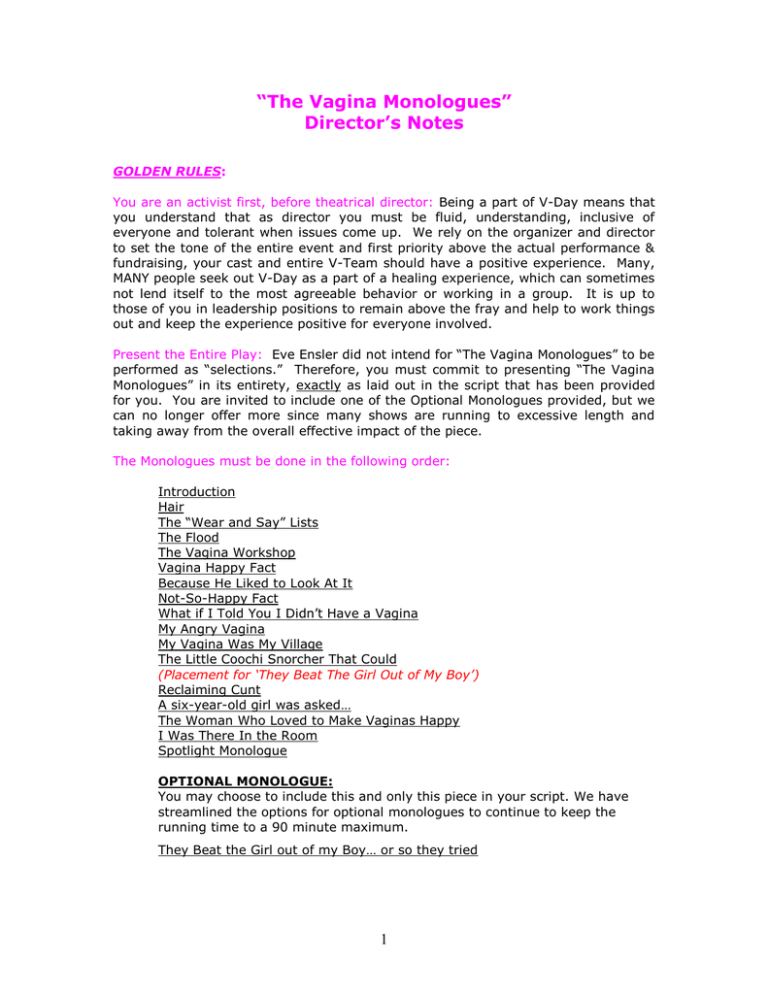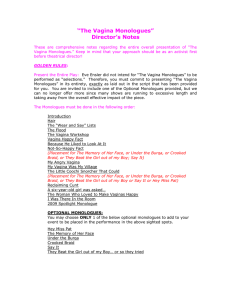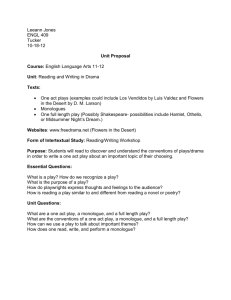“The Vagina Monologues” Director’s Notes
advertisement

“The Vagina Monologues” Director’s Notes GOLDEN RULES: You are an activist first, before theatrical director: Being a part of V-Day means that you understand that as director you must be fluid, understanding, inclusive of everyone and tolerant when issues come up. We rely on the organizer and director to set the tone of the entire event and first priority above the actual performance & fundraising, your cast and entire V-Team should have a positive experience. Many, MANY people seek out V-Day as a part of a healing experience, which can sometimes not lend itself to the most agreeable behavior or working in a group. It is up to those of you in leadership positions to remain above the fray and help to work things out and keep the experience positive for everyone involved. Present the Entire Play: Eve Ensler did not intend for “The Vagina Monologues” to be performed as “selections.” Therefore, you must commit to presenting “The Vagina Monologues” in its entirety, exactly as laid out in the script that has been provided for you. You are invited to include one of the Optional Monologues provided, but we can no longer offer more since many shows are running to excessive length and taking away from the overall effective impact of the piece. The Monologues must be done in the following order: Introduction Hair The “Wear and Say” Lists The Flood The Vagina Workshop Vagina Happy Fact Because He Liked to Look At It Not-So-Happy Fact What if I Told You I Didn’t Have a Vagina My Angry Vagina My Vagina Was My Village The Little Coochi Snorcher That Could (Placement for ‘They Beat The Girl Out of My Boy’) Reclaiming Cunt A six-year-old girl was asked… The Woman Who Loved to Make Vaginas Happy I Was There In the Room Spotlight Monologue OPTIONAL MONOLOGUE: You may choose to include this and only this piece in your script. We have streamlined the options for optional monologues to continue to keep the running time to a 90 minute maximum. They Beat the Girl out of my Boy… or so they tried 1 Running time and Intermission: The show can be absolutely no longer than 90 minutes and CANNOT include an intermission. Please keep this in mind when you are choosing an optional monologue or adding to the piece at all. Present Eve’s Work ONLY: Your production CANNOT include the writing of any other playwrights, as Eve Ensler should be the sole author of the evening. CASTING: Include everyone who shows an interest in being involved: Whether on the stage or behind the scenes, we require that you include everyone interested in being a part of your event. People are often drawn to V-Day for very personal reasons and it is important that they be afforded the opportunity to be a part of the event. You should strive to use numerous performers in the production. “The Vagina Monologues” cannot be performed as a solo piece. You don’t have to cast them, but you must offer them a way to be involved. Use an All Female Cast: All performers in the entire V-Day production must be female. Men are welcome to participate fully behind the scenes. We have been asked what defines a “woman” in terms of assembling a female cast. We don't want to provide any rigid definitions or categories because often, when you try to classify people, some people are left out, misunderstood or misrepresented. Since our rules require you to cast only women in your production we suggest using the following guideline to determine who "qualifies": People who lead their lives as women are eligible to perform in your production. This includes people who are born as women as well as transgendered individuals. In 2004, the first transgendered V-Day took place and this is how the trans-director defined it for us: “My reading of the play and it's history led me to believe that it called for actresses who lived in the world of women, experienced the issues of women and who did not have access to the power position of the male role in today's world.” We leave it to your good judgment and your sensitivity to specific situations to make the casting decisions for your individual production. If you have a dilemma, don’t hesitate to call or write (campaigns@vday.org) so that we can help! Diversity: Although you might be limited by your geographic location, please make every effort to assemble as diverse a cast as possible. This may mean reaching out to a new group of women for the first time, but that is one of the challenges and rewards of V-Day. The issue of violence transcends race and class so please embrace that idea in the diversity of your V-Day casting and audiences. It is critically important to Eve that there be diversity in all productions of her play – VDay and commercial – so she expects everyone to do their best to achieve a diverse cast. Performers: Think beyond thespians. A V-Day benefit production of “The Vagina Monologues” is not a typical theatrical performance. It doesn’t matter whether or not the members of your cast have acted before; some of the most powerful performances at V-Day events have been by people with no acting experience. College productions should pursue on-campus people; community productions should pursue people in the community; and high schools should pursue people within their school. Having a broad range of performers often helps to draw in different crosssections of your community. If you think some of these women would be uncomfortable “acting” in public, you can always ask them to read a “Vagina Fact” or part of a “Vagina List.” 2 Auditions: A V-Day audition is not an audition in the traditional sense. Rather, it should be a gathering of anyone interested in being involved, a place to identify roles for everyone, whether on or off the stage. By coming to the audition, people are showing an interest in being a part of V-Day so welcome them into the movement. You shouldn’t turn anyone away. Number of Performers: The V-Day script of “The Vagina Monologues” can be performed with any number of women (minimum of 5). Some of the monologues lend themselves to having numerous performers and the more the merrier. PHYSICAL PRODUCTION: Sets: “The Vagina Monologues” has been performed on a bare stage with stools or chairs, a standing microphone and simple lighting on the performers. Have fun with your design of the stage and theater, but don’t distract from the monologues by adding busy scenery. Sometimes a simple, “vaginal” piece of fabric draped behind the performers works perfectly. Costumes: Think simplicity! Think vaginally! Any color you would associate with your vagina should work. Red feather boas have been used to great effect. See if local designers will donate outfits. But you can also design your own wonderful creations. Staging: The show was originally performed with the actresses standing or sitting on high stools. The performers must read from script cards as opposed to memorization. This convention is used in all the professional productions of the play and serves to remind the audience that these are real women’s stories. The monologues are usually read from white 4 X 6 index cards, which can be turned over easily and do not block the actresses’ faces. The show works best with a simple presentation, so adding movement or “staging” during the monologues is not necessary. You can either keep all the actresses on stage throughout the show or have them enter and exit. Sound: While it is customary in many performances of TVM, the use of microphones are definitely not necessary for the performance and should only be used if the sound system is of a professional caliber. It is helpful if the microphones are on stands so that the performer’s hands are free to hold index cards. ENHANCING YOUR PERFORMANCE: You have the option to enhance your production by including music, dance, and testimonials by activists or anti-violence leaders. These additions can be included in your production at your discretion, but keep in mind that the play itself is lengthy so be selective and sensitive to the time factor. Remember that everything you add will lengthen your total performance time and you have your audience’s interest and attention to consider. Please also be sure that anything you add complements the spirit of the play, doesn’t compromise its integrity, and only use women performers. Testimonials: If you want to include personal testimonials written by women in your community and/or particularly inspirational works by published authors, you can always print their contributions in a program supplement or find other ways to honor their creativity that are artistically separate from your production. 3 On-Site Counselors: Ask your beneficiary organizations set up information tables or booths in the lobby of your theatre with representatives from the organizations available to answer questions and talk to people. Counselors are especially useful if you have post-performance Vagina Dialogues. Vagina Dialogues: Facilitate a post-performance talkback session. At many events when Eve is present, she asks the audience at the end of the show to stand up if they have been or know anyone who has been sexually abused. The response is always overwhelming. Post-performance dialogues can be as powerful as the performance itself. Ask your actresses to participate, to talk about their experiences performing The Vagina Monologues. REHEARSALS: We encourage you to have as few rehearsals as possible. Not only are the monologues pieces that are best discovered in front of an audience as a very LIVE event, but your cast will be more likely to show up for two rehearsals close to your performance dates than to two rehearsals every month. And they will by more likely to look forward to them and be able to attend them if there are fewer of them. Participating in a V-Day production is supposed to be fun, educational and empowering, not a burden. You don't want your cast to lose their enthusiasm for the play or for V-Day due to over-rehearsing. And, especially if you plan to have your performers read from the script or index cards, there is even less reason for extensive rehearsal. Normally a few days of rehearsal and one technical and dress rehearsal is sufficient. With that said, we LOVE to hear about cast and Vteam gatherings! A chance for the entire group to bond can be just as useful as a rehearsal. They will open up to one another and create a safe space for each other to discover their interpretation of each monologue. STAGING THE PLAY: The overall spirit of the play should be one of celebration and humor. The comedy in “The Vagina Monologues” is what gives the piece its unique ability to enlighten the audience without preaching to them. The performances need to be brave, fierce and funny. The actresses need to enjoy each other, enjoy the audience and shed their inhibitions - they should go for honesty, simplicity and humor. It is also crucial that the entire performance keep at a quick pace. There should be a concerted effort the keep the evening to a very focused length of no longer than 90 minutes with NO INTERMISSION. These pieces are not meant to be dramatic interpretations: The monologues are anecdotal and rely on good old-fashioned storytelling to come across well; they are real and very human so the performers should embrace that concept and keep the “acting” to a minimum! The women who were interviewed for this piece did not see themselves as victims on any level. If any of the monologues are delivered from a place of shame, self-pity or remorse they will counteract the message of the performance. Introduction This sets the tone for the entire play so be sure to play up the humor and let the audience know this is going to be an evening of laughter and emotions. You can add a name for the vagina that is specific to your community, state or country. 4 Hair This is a woman who may be slightly bitter, but newly empowered and enlightened! “Hair” is the first piece in the show so it is important to find humor in it and, as always, stay away from self-pity. “Hair” has been performed as a Southern woman, a Puerto Rican woman, a West Indian woman, (i.e. it could be any woman) etc. The “Wear and Say” Lists Because it is so straightforward, this is a terrific monologue for people of all different acting abilities. This is one monologue where you can add some personal input from your cast’s experiences. Add only a couple so as to keep to the show’s time limit! *This is an excellent piece for multiple performers. The Flood “The Flood” has been performed as an older Jewish woman, a Southern woman, a Midwestern woman, etc. A big “trap” for this piece is to let the performer speak from a remorseful place so that the audience feels pity for her. Keep in mind that her flooding story is an unexamined experience and that she doesn’t feel sorry for herself or feel traumatized by her past. She is a funny, sassy lady who feels like she’s had a pretty good life and hasn’t missed out on anything. As always, we are looking for the performer to tap into the truth of her experience and this can be accomplished with an actress of any age or ethnicity. The Vagina Workshop The speaker has an accent that reflects that she is extremely proper (upper class) – the last woman on earth that you’d expect to find in a Vagina Workshop! This is a long, complex piece and the actor needs to move through each section with attention to quick pacing and story arc. Vagina Happy Fact Celebrate this fact and rejoice in every word! You can repeat this fact throughout the evening. Feel free to invite your audience to request it at any time. We do want to caution against this fact being TOO over the top. The last thing you want is the men in your audience to feel alienated by their lack of nerve-endings. Because He Liked to Look At It This piece is quite self-explanatory and works well with a variety of interpretations and characterizations. Not-So-Happy Fact This “Fact” is heartbreaking and the actress should take her time and great attention with it. What if I Told You I Did Not Have a Vagina This piece is about the women of the Democratic Republic of Congo. While it tells of the brutalization they face, the focus should be on their unstoppable resilience, fierce energy and brilliant spirits. My Angry Vagina The “title” can be omitted so that the speaker just begins with “My Vagina’s Angry.” A fierce energy is appropriate for this very pissed-off piece. Any actress performing this monologue should feel free to “let it rip,” and turn the theater into a rally! So, 5 the note here is that it can never be too angry. This is a woman who is fed up and is ready to speak her mind. Amen! My Vagina Was My Village In the introduction to the “Bosnia” piece, there is a rape statistic for the United States. If you are doing a production elsewhere, you should replace this statistic with one from your country. The “Bosnia” monologue benefits from a very simple delivery. The language is quite graphic, so the actress should let the words speak for themselves. A lot of dramatics can overwhelm the piece and alienate the audience. The actresses performing “Bosnia” should familiarize herself with the Balkan conflict and the atrocities of the rape camps. They should also research the Muslim community in Bosnia, as their culture compounds the tragedy of rape by expelling these “ruined” women from their communities. The monologue is distinctly split into two voices - that of present and past - dramatizing the struggle between the two selves and making it a perfect piece for two actresses. The Little Coochi Snorcher That Could As indicated, the speaker is a Southern woman of color but women of diverse ethnic backgrounds have performed this monologue wonderfully. In this monologue, we follow the story of a young girl from a healthy, curious child to a damaged and violated teenager. In her journey, we recognize the plight of many sexually abused women as they become dangerously detached from their own bodies and themselves. This is a true story of salvation and not an endorsement of underage sex. “Coochi” is not meant to be judged for its morality but admired for its tenderness. Again, the telling of this sad but beautiful tale should not be tinged with self-pity but with frankness and honesty. Reclaiming Cunt “Cunt” is an incredibly powerful monologue. When Glenn Close performed this piece at V-Day 2001, she had all 18,000 people in the audience screaming “Cunt” with her by the time she reached her “climax.” Of all the monologues in the show, “Cunt” provokes the most fear from actresses and audiences because the word is so vulgar and shocking in our (American) context. That being said, the actress who performs “Cunt” needs to transform the word from something vile and derogatory into something powerful, sexy and delicious. She can do this by finding a rhythmic energy and pacing that builds into a frenzied climax. No small task, but if the actress fully “attacks” this piece with no inhibitions or timidity, this can be achieved! Whatever her style of delivery, the actress should “get into her cunt groove” and sing out sister! A six-year-old girl was asked… This piece should be performed in a straightforward manner, without pretense, the way six-year-old girls are clear and lack self-consciousness. You should stay away from a childlike delivery. It ruins the genuine nature of the answers. By this age, girls can be shockingly grownup and definitive in their way of looking at the world. The Woman Who Loved to Make Vaginas Happy No, a “sex worker” is not your traditional therapist - this woman is a dominatrix. She lives to shock and seduce the audience, dominate them and make them squirm in their seats. She loves sounds, including the sound of her own voice. At the end of the monologue, she has a symphony of moans and then the party really gets 6 started. The “moaning” is a grand climax to the evening, but the actress must keep a careful balance between giving the moans their full due and keeping them based in reality. If you are looking to utilize your cast more, you can have the entire cast or some of the cast, do a moan each. I Was There In the Room This monologue is a poem and care must be taken to deliver it as such. The actress should be encouraged to find a simple, heart-felt delivery. There are no big theatrics needed here as the beauty and power of the writing does the work for her. The actress should take her time to paint the images and find the awe and reverence in this everyday miracle that we all take for granted. This monologue is based on Eve’s observations of her granddaughter’s hospital birth. In this monologue, Eve is in no way endorsing a particular birthing practice. As with all of the monologues, it is not advocating a specific point of view, it is an account of one woman’s experience. They Beat the Girl out of my Boy… or so they tried (books & film suggestions to educate about transgender issues http://vspot.vday.org/library/en/tvm/trans) This monologue for five transwomen is a composite of the stories told to Eve by over twenty transwomen brought together for three days of discussion and sharing in a secluded Californian cabin. The women were aged from early twenties to fifties; they began transition at ages from early teens to forties; they identified as heterosexual, lesbian or bisexual and all of the women lived "full time," meaning 24/7, as themselves (female). They worked jobs such as lawyer, doctor, writer, actress, social worker, sales associate, engineer and student and were Caucasian, African American, Latina, Asian actresses from Jewish, Christian, Agnostic, Atheist, and other religious backgrounds. These Director’s Notes are from the trans director of the first Trans V-Day in LA in 2004. “Most transwomen who read these monologues find at least some elements of commonality in the stories told, so little explanation will be needed as to why and whence for the feelings expressed.” “At first, I had the women read the pieces in a group as if they were in a private place, sharing hurts and remembrances with each other in that deeply open way that people can have with others who they know come from the same experience. This was a good way to introduce the material to them and begin establishing bonds, because ultimately this was a "stand together and claim your arrival at the end of a journey" piece for me.” “This was a good start, but ended up feeling more closed off than I wanted. I shifted the focus outward and had the women telling the stories to someone they cared about, someone they wished would understand so that a relationship (of any of the various kinds) could be enriched.” “Pacing was very important to me, with the broken up dialague and single thoughts spread over several readers. I wanted them to be a single teller 7 coming from all directions with these lines spread across more than one reader. At the same time, I wanted each reader to have a unique note that resonated even in her chorus parts. One was young and bright, one older and settled, one heavily accented, etc.” “It was very important to me in our trans-performed production (and thus in microcosm with the trans monologue) that the readers be transwomen living full time, who were unequivocal about their gender and status as women. This rigid definition is/was possibly a controversial position both in and out of the trans community, but in keeping with the larger theme of V-Day and the play, I personally felt it was important to work with actors who lived in the world of women and experienced the issues and circumstances of women, in addition to the circumstances of transsexuals. Thus, I did not cast any drag queens, part-time transsexuals, "gender-queer" individuals or others who, while certainly living valid and contributory lives, were outside the spirit of the project and monologue in my opinion.” [*** please see additional note on this below] It is a simple, powerful piece and will stand on its own under the same direction and care that a director would give to any of the other pieces in the play. *** All women, trans or not, should be able to perform the piece, although I'm sure that most directors will try their hardest to include transwomen in the performance of this (and hopefully other) monologues. My own casting choices were made to include women (trans or not) and rechannel the involvement of people outside the women's issues addressed in "TVM". Many people ostensibly under the "Trans" umbrella live in the sometimes indistinct gray area that can appear between the "male" and "female" gender constructs, not really completely part of female society and not completely a part of male. Some will be interested in performing in "The Vagina Monologues" for many reasons, but just as in the situations where some males have expressed interest in performing, it seemed to me that it was important to only have people reading whose voices would ring with the truth and empathy of the experience of womanhood Eve has written about. My reading of the play and its history led me to believe that it called for actresses who lived in the world of women, experienced the issues of women and who did not have access to the power position of the male role in today's world. Thus I was careful to only cast transwomen who were living full time and who were integrated into the society of women as a whole, facing the same issues of violence but also some unique situations relating to our transition. 8




